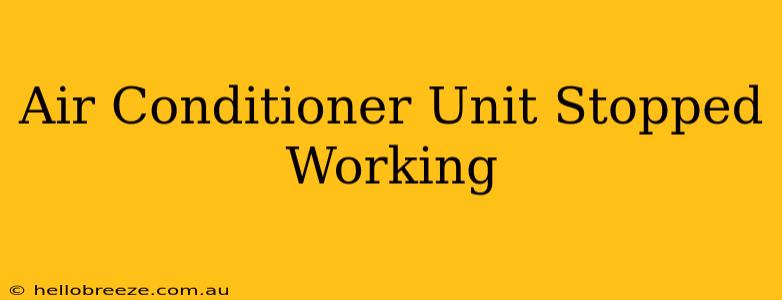Is your air conditioner refusing to cooperate on a scorching hot day? A non-functional AC unit can quickly turn a comfortable home into an unbearable oven. Don't panic! This guide will walk you through troubleshooting common AC problems and help you determine whether you need a professional repair or can tackle the issue yourself.
Common Reasons Why Your AC Unit Stopped Working
Before calling an expensive repairman, let's explore the most frequent culprits behind a malfunctioning air conditioner:
1. Power Issues:
- Tripped Breaker or Blown Fuse: This is the most common and easiest fix. Check your home's electrical panel for a tripped breaker (it will be in the "off" position) or a blown fuse (it will be visibly broken). Simply reset the breaker or replace the fuse. If it trips again immediately, there's a more serious electrical problem requiring professional attention.
- Power Cord Issues: Examine the power cord connected to your AC unit for any visible damage, such as fraying or kinks. A damaged cord needs replacing – never attempt repairs yourself.
2. Thermostat Troubles:
- Incorrect Settings: Double-check that your thermostat is set to "cool" and that the temperature is set lower than the current room temperature.
- Dead Batteries (for some models): If your thermostat runs on batteries, replace them with fresh ones.
- Thermostat Malfunction: A faulty thermostat can prevent the AC unit from receiving the signal to turn on. Try replacing the batteries first; if the problem persists, the thermostat itself might need replacing.
3. Refrigerant Leaks:
- Low Refrigerant: This is a more serious issue. A refrigerant leak means your AC unit isn't able to cool effectively. You'll likely notice a lack of cool air and possibly a hissing sound. This requires professional attention. Attempting to fix this yourself can be dangerous and void warranties.
4. Frozen Evaporator Coil:
- Restricted Airflow: Dirt, debris, or a clogged air filter can restrict airflow, causing the evaporator coil to freeze. Clean or replace your air filter regularly. Also, ensure that the vents aren't blocked. If the coil is frozen, turn off the unit and allow it to thaw completely before attempting to restart it.
5. Compressor Problems:
- Compressor Failure: The compressor is the heart of your AC unit. If it fails, the unit won't cool. This is a major repair and requires professional help. You may hear unusual noises, like loud buzzing or clicking, before complete failure.
6. Condenser Unit Issues:
- Dirty Condenser Coils: Similar to the evaporator coil, a dirty condenser coil can significantly reduce efficiency and cause the unit to malfunction. Clean the coils using a coil cleaner and a garden hose. Be careful not to damage the fins.
When to Call an HVAC Technician
While many minor issues can be addressed at home, some problems demand the expertise of a qualified HVAC technician:
- Refrigerant Leaks: Handling refrigerants requires specialized knowledge and equipment.
- Compressor Failure: This is a major repair requiring professional diagnosis and replacement.
- Electrical Problems: If you're uncomfortable working with electricity, it's best to leave it to the professionals.
- Persistent Problems: If you've tried basic troubleshooting steps and the problem continues, it's time to call for professional help.
Remember: Safety is paramount! If you're unsure about any repair, don't hesitate to contact a qualified HVAC technician. A small investment in professional service can prevent larger, more costly problems down the road. Your comfort and safety are worth it!

